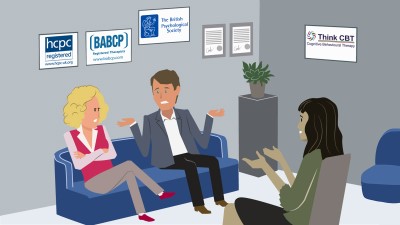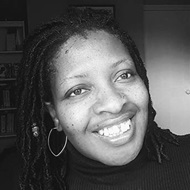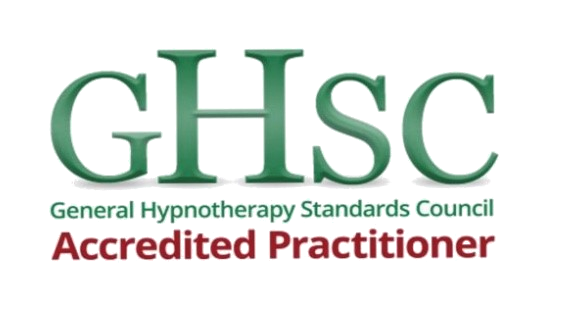CBT Treatment for Relationship OCD - R-OCD in London, UK-wide and online by Video Link
Experiencing continuous worry or doubt in relationships is not always a sign that something is wrong with the relationship itself. Where there is a history of obsessional worry and checking behaviours, this could indicate that Relationship OCD (ROCD) is causing relationship problems or difficulty with personal commitment. There are many under qualified therapists offering dubious relationship advice, without the relevant OCD experience or recognised clinical training in CBT.
If you think that your relationship is affected by ROCD, it's important that you speak to a qualified CBT specialist with specific experience in the treatment of relationship OCD. Cognitive Behavioural Therapy is the recommended treatment of choice for ROCD and the research data demonstrates that it works. To book an initial CBT consultation, call +44 1732 808626 or email appointments@thinkcbt.com
What is Relationship OCD?
Relationship OCD - ROCD, is a specific sub-type of Obsessive Compulsive Disorder involving persistent doubt and worry about compatibility, attraction, commitment and control within the relationship itself. ROCD behaviours include questioning feelings of love and intimacy, fixating on physical features or personal characteristics, avoiding commitment, reassurance seeking, testing and comparing the relationship.
The obsessional doubts, avoidance and checking behaviours lead to high levels of emotional distress for both partners, contributing to cycles of conflict, rejection and withdrawal. The continuous testing, questioning, comparing and withdrawing undermines the stability of the relationship and creates the feelings of uncertainty that trigger further ROCD behaviours. This can become so intense that the sufferer often chooses to end the relationship rather than face the anxiety, guilt, responsibility and uncertainty of the obsessional worries and doubts.
Like other checking based forms Obsessive Compulsive Disorder, ROCD is primarily maintained by an intolerance of uncertainty, perfectionistic thinking and a high responsibility bias. Whilst ROCD symptoms often occur alongside other OCD patterns, it can often form the primary OCD presentation. It is however unlikely that individuals will experience ROCD without a history of other obsessional or compulsive behaviours.
Common ROCD Obsessions include:
- Continuously reflecting on or ruminating over your partners imperfections and your compatibility as a couple.
- Thinking about your partner's physical imperfections, characteristics or habits.
- Internally questioning your partner's personality or whether they are interesting, funny or smart enough.
- Dwelling on whether you are in the “right” relationship or if someone better is out there.
- Worrying about sex or experiencing anxiety about the possible lack of intensity or intimacy.
- Doubts that if you commit to the relationship, your partner will let you down, leave or cheat.
- Worrying whether you will let your partner down or cheat with another person.
- Questioning whether the problem is OCD or the wrong relationship
- Worrying that you can no longer tolerate the doubt and anxiety.
Common ROCD compulsions include:
- Continuously seeking reassurance or validation by asking friends or family.
- Researching on the internet or engaging in online groups about relationship problems.
- Constantly questioning your partner about trivial aspects of the relationship.
- Testing, questioning and comparing your level of attraction with friends, exes or strangers.
- Examining facial features, body size or shape, the way they speak or other personal characteristics.
- Testing and self-checking for feelings of passion, intensity and excitement.
- Avoiding intimacy and small acts of physical contact such as holding hands.
- Avoiding romantic movies or material that brings up doubts about your own relationship.
- A reluctance to commit to the next step in your relationship, due to feelings of overwhelming responsibility and uncertainty.
Whilst many of the above patterns can be found in healthy committed relationships, the frequency, intensity and duration of these thinking and behavioural habits is significantly higher in ROCD. People who experience ROCD report obsessional relationship doubts and intense distress about whether their relationship is right. This doubt and distress overshadows the relationship and can lead to the very feelings of confusion, insecurity, conflict, withdrawal or rejection that the sufferer fears.
How ROCD is Treated

The most effective treatment for ROCD is Cognitive Behavioural Therapy. This is a highly structured approach that involves cognitive reappraisal of intrusive and obsessional thoughts and a process known as Exposure Response Prevention (ERP), to alter unhelpful checking or reassurance seeking behaviours.
A specific form of CBT known as Acceptance and Commitment Therapy (ACT) has also been found to be highly effective at helping ROCD sufferers to defuse or unhook from ROCD obsessions.Treatment involves using CBT and ACT to interrupt, de-escalate and normalise the patterns of negative thinking and behaviour that maintain relationship uncertainty.
The client is taught how to defuse from negative thoughts, acknowledge and tolerate relationship uncertainty, to suspend or alter their checking / testing behaviours and to commit to acting in accordance with their values and relationship goals.
Treatment for Relationship OCD involves learning how to make the negative thoughts about self-doubt, insecurity or uncertainty less relevant. Clients learn that having a negative thought about their partner, does not mean that they must act on the thought to resolve or avoid feelings of uncertainty.
Polly's Story - a real-life case study
Polly was a 31-year-old client referred for ROCD treatment. Polly had a history of checking and contamination based OCD, including obsessions about her sexuality, harm to others and medical health. Polly had also experienced several relationship break-ups and found issues of long-term commitment highly distressing. Polly had recently ended a long-term and committed relationship due to her obsessional doubts and following the inappropriate advice of a relationship counsellor with no formal training in CBT.
Following a clinical assessment of Polly's OCD symptoms, it was clear that obsessional and compulsive behaviour had directly contributed to a history of relationship distress and consequential patterns of avoidance and control. Polly had attempted to resolve severe anxiety about uncertainty by seeking reassurance, checking, comparing, avoiding commitment or ending her relationships.
The CBT process involved setting clear therapy goals and work on personal values, learning about the OCD cycle, cognitive reappraisal of negative and catastrophic thoughts, handling uncertainty, work on worry and self doubt, acceptance and defusion techniques to unhook from repetitive thoughts and training in present moment attention approaches including mindfulness. This process was underpinned by behavioural experiments and a systematic process of Exposure and Response Prevention (ERP).
Following 12 sessions of CBT, Polly was able to resume and commit to a healthy long-term relationship with her partner. She still experiences occasional intrusive thoughts about her relationship, however she is now able to normalise and let go of the struggle with unhelpful and unwanted thoughts. Polly no longer engages in checking, testing or avoidance behaviours to resolve normal levels of uncertainty.
This client wanted to share there experience to provide hope and education to other ROCD sufferers. The client's information has been changed to protect confidentiality and provide anonymity.
Members of Our Team Specialising in Relationship OCD
The following team members have completed specialist Cognitive Behavioural Therapy training and have direct experience in the treatment of Relationship OCD. Always check the CBT credentials and experience of your therapist before engaging in any form of OCD treatment.
To find out more about R-OCD or to talk to a BABCP accredited Cognitive Behavioural Psychotherapist about treatment options, contact appointments@thinkcbt.com
















